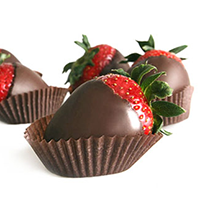Does Chocolate Contribute to Acne Breakouts?
 Many factors can add to the prevalence of acne in some individuals. These include age, family history and possibly stress levels.
Many factors can add to the prevalence of acne in some individuals. These include age, family history and possibly stress levels.
Until the 1960s, many health care professionals believed that eating chocolate exacerbated acne, the skin condition characterized by pimples or spots. Textbooks written in the 1940s and 1950s warned against consuming sugary foods and beverages, including chocolate.
However, an influential study conducted in 1969 served to strike down the association between chocolate and acne. Research was conducted using 65 participants with mild-to-moderate cases of acne. The participants were split into two groups: one group was given chocolate bars with 10 times the normal amount of cocoa, and the other received a placebo. After a three-week break, the groups switched bars. The researchers examined the participants weekly and concluded chocolate had no effect on acne breakouts.
However, a 2011 letter signed by seven different medical researchers criticized that study and its findings.
"This study, to my mind, is invalid," claimed Amy Brown, an associate professor at the University of Hawaii at Manoa and one of the signatories mentioned above. "The very first problem is that it was made possible through the Chocolate Manufacturers' Association of the United States of America - that's number one."
Other researchers agree. Samantha Block of the University of Miami Miller School of Medicine performed a pilot study reported in the Journal of the American Academy of Dermatology.
Block and her team used 10 male volunteers between the ages of 18 and 35. All had between one and four non-inflamed acne spots but were not suffering from what would be considered a "bad flare-up" of the condition. No women were used in the study because of the hormonal effects of women's menstrual cycles, which is known to affect acne.
"We wanted to emulate what people typically consider exacerbating their acne, which is a binge chocolate consumption," says Block. She used 100 percent cocoa chocolate in her study.
Block found that the participants' acne increased in direct proporation to the amount of chocolate they had eaten. She hopes to test her findings with larger groups of participants in the future.
A few facts about acne:
- In industrialized nations, acne affects more than 80 percent of adolescents.
- Acne remains a problem for some adults as well, with 24 being the mean age of those seeking treatment in the U.S.
- Whiteheads and blackheads occur when an individual's pores become blocked with sebum, a natural mositurizer for the skin.
- Sebum-producing glands are sensitive to hormones. This is why teenagers and some pregnant and pre-menstrual women are more prone to having acne attacks.
- When blocked pores become inflamed, they turn into acne spots.
- Acne treatments can include preparations that attack bacteria, and in extreme cases, the use of antibiotics.
Posted in Does Chocolate Contribute to Acne Breakouts?
Ask a Question Or Join a Discussion


